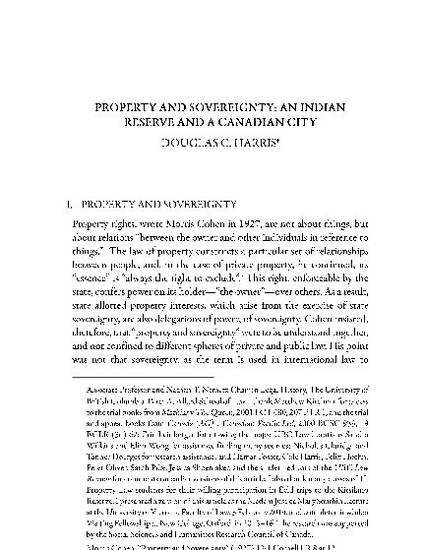
- property; sovereignty; Indian reserves; cities; Canada
Property rights, wrote Morris Cohen in 1927, are delegations of sovereign power. They are created by the state and operate to establish limits on its power. As such, the allocation of property rights is an exercise of sovereignty and a limited delegation of it. Sixty years later, Joseph Singer used Cohen’s conceptual framing in a critical review of developments in American Indian law. Where the US Supreme Court had the opportunity to label an American Indian interest as either a sovereign interest or a property interest, he argued, it invariably chose to the disadvantage of the Indians. Within Canada, Indigenous peoples have struggled to have their interests recognized as property rights, let alone as sovereign power. As John Borrows makes clear, Canadian courts have established Canada’s sovereignty as the jurisdictional bedrock on which Indigenous peoples must establish their property rights. This article uses the uses the concepts of property and sovereignty as revealed by Cohen and as interpreted by Singer and Borrows in the context of the rights of Indigenous peoples to recount the history of the appearance, disappearance, and reappearance of an Indian reserve in the City of Vancouver. Allotted by the colony of British Columbia in the 1860s and expanded in 1876 after British Columbia joined the Canadian confederation, the Kitsilano Indian Reserve is one of more than 1500 Indian reserves scattered across the province. Using archival material, much of it introduced in litigation, the article examines the changing character of the Indian reserve in the nineteenth and twentieth centuries as a property interest and as a limited delegation of sovereignty, in a context where the distribution of sovereignty between Indigenous peoples and the Canadian state remains unresolved.
